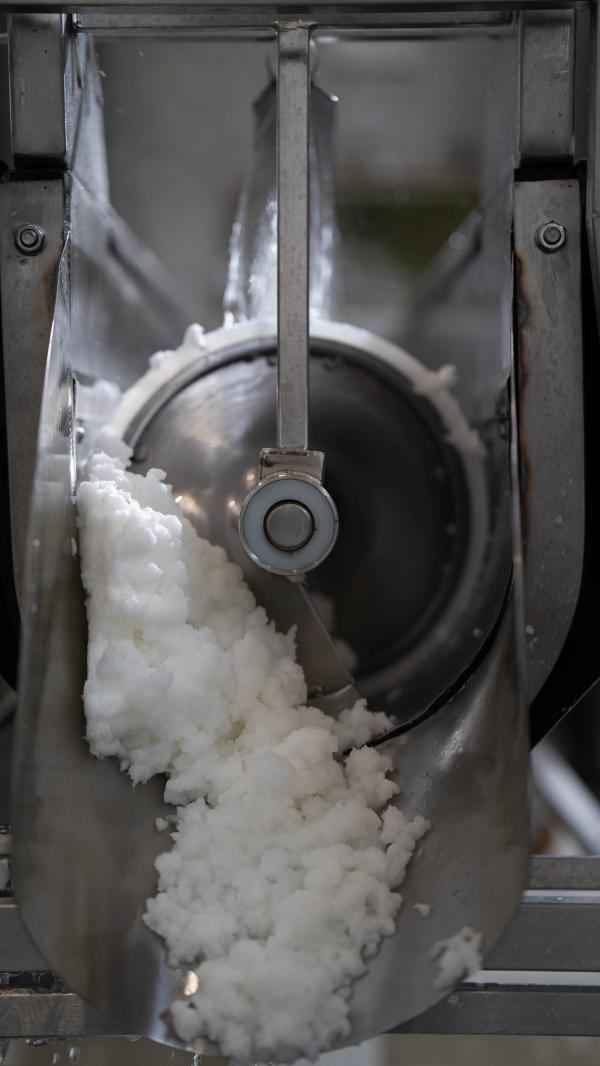Italian company reuses tons of pulp waste to make fabric that won’t hurt the environment
Like many things we enjoy without much thought, that glass of orange juice in the morning comes with hidden costs.
In that single glass, 40% to 60% of the fruit —rind, pulp, seeds— is wasted. In Italy alone, that accounts for one million tons of citrus juice by-products annually.
As part of a school research project in Milan in 2012, Adriana Santanocito, a fashion design student from Sicily, asked a farfetched question: What if you could turn all that waste into a sustainable fabric and make clothes out of it?
Enrica Arena, a partner in this research project and also from Sicily, saw the potential in her friend’s idea and thought it also could help their home region.
They started working with a professor at the Polytechnical University of Milan, investigating whether the idea was technically feasible. In 2013, they found a way to extract cellulose and make fabric, and they patented the process. In 2014, Orange Fiber was born.
“It was a long process from that point,” says Enrica, the company’s chief executive officer. “It’s not rocket science, but we didn’t know how many trials and how many adjustments we would need to make to really have the right product with an industrial fit.”
Conscious consumption bears its fruits
As awareness has grown in recent years of the environmental harm caused by the fashion industry, clothing makers have been looking for ways to become more sustainable. At first, fashion companies were both curious and sceptical about the fabric from Orange Fiber. That changed when the Italian luxury clothing company Salvatore Ferragamo took an active interest in Orange Fiber.
“We had our very first pioneer Italian brand decide to believe in us, to start this process of validating the products up to the point where they created a dedicated collection in 2017,” Enrica says. “After that our life was pretty much easier.”

Enrica Arena, chief executive officer at Orange Fiber
Orange Fiber, with a team of eight employees, has produced more than 15,000 meters of its fabric and has reused more than 120 tons of citrus by-products. The company has collaborated with several large companies. H&M used Orange Fiber fabric to create a blouse that sold out quickly. Orange Fiber also provides material for E. Marinella, an Italian specialist in men’s ties.
Orange Fiber won second place and €30,000 in the Sustainable Living category in the 2021 Social Innovation Tournament. The company also won the tournament’s Audience Choice Award and a further €10,000. The contest was created by the EIB Institute to support entrepreneurs who are helping the environment and society. Orange Fiber has won numerous other honours and awards, including the Ideas for Change Award from the United Nations Economic Commission for Europe in 2015.
Sustainable and silky
Orange Fiber tries to be as environmentally responsible as possible while creating a fabric with a luxurious, silky hand. “We wanted to demonstrate that sustainable and recycled materials can be as luxurious as virgin ones,” Enrica says.

Orange Fiber extracts cellulose from fruit pulp
Alice Kaimann, the project manager for Orange Fiber, says the company is always verifying and improving its efforts to be sustainable.
“We’re putting our efforts in making the whole industry more circular in a closed loop,” Alice says. “We’re aiming to have a differentiated collection of bio-based materials that are biodegradable and compostable.” She added that the goal is to have a green, short and traceable supply chain.
The company hopes to expand production into other countries where citrus production is a big industry, like Spain. The company’s patent already covers the United States, Brazil, Mexico, and India.
“Our big dream is to first consolidate the company in Europe,” Enrica says, adding that she hopes to get funding from the European Union to increase production.
The company already has a partnership in Austria with Lenzing Group, a global producer of fibre made from wood pulp. The two companies are making the first Tencel lyocell material made of orange and wood pulp. Tencel is a brand name for a set of fibres called lyocell and modal that are soft and often used in sustainable fashion.
Enrica is sometimes surprised that her growing company emerged from research for a study project. “I think what sometimes excites me but also scares me is the idea that to make it bigger and thriving, it will need five or six more years of this level of commitment and effort,” she says.
